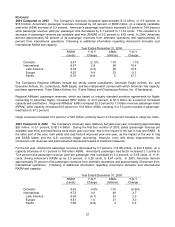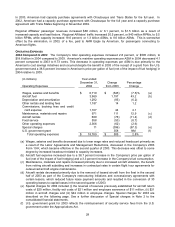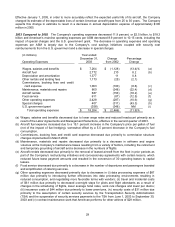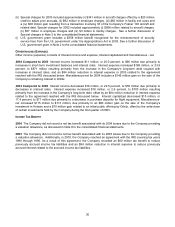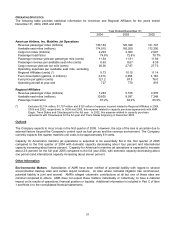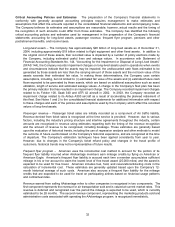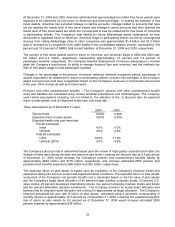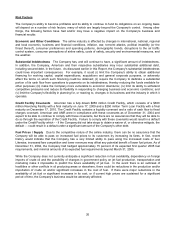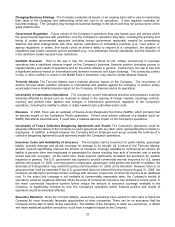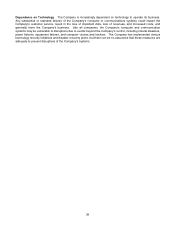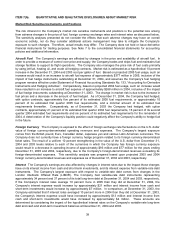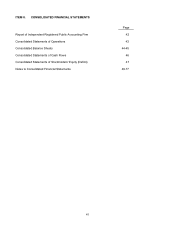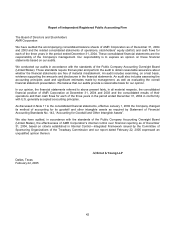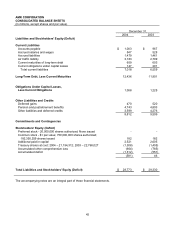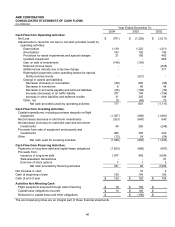American Airlines 2004 Annual Report Download - page 40
Download and view the complete annual report
Please find page 40 of the 2004 American Airlines annual report below. You can navigate through the pages in the report by either clicking on the pages listed below, or by using the keyword search tool below to find specific information within the annual report.37
Changing Business Strategy The Company evaluates its assets on an ongoing basis with a view to maximizing
their value to the Company and determining which are core to its operations. It also regularly evaluates its
business strategy. The Company may change its business strategy in the future and may not pursue some of the
goals stated herein.
Government Regulation Future results of the Company's operations may vary based upon any actions which
the governmental agencies with jurisdiction over the Company's operations may take, including the granting and
timing of certain governmental approvals (including foreign government approvals) needed for codesharing
alliances and other arrangements with other airlines, restrictions on competitive practices (e.g., court orders, or
agency regulations or orders, that would curtail an airline’s ability to respond to a competitor), the adoption of
regulations that impact customer service standards (e.g., new passenger security standards), and the adoption of
more restrictive locally-imposed noise restrictions.
Conflicts Overseas Prior to the war in Iraq, the increased threat of U.S. military involvement in overseas
operations had a significant adverse impact on the Company’s business, financial position (including access to
capital markets) and results of operations and on the airline industry in general. Furthermore, the war in Iraq had
a significant adverse impact on international and domestic revenues and future bookings. The continuing conflict
in Iraq, or other conflicts or events in the Middle East or elsewhere, may result in similar adverse impacts.
Terrorist Attacks The Terrorist Attacks had a material adverse impact on the Company. The occurrence of
another terrorist attack (whether domestic or international and whether against the Company or another entity)
would again have a material adverse impact on the Company, its finances and/or its operations.
Uncertainty in International Operations The Company's current international activities and prospects could be
adversely affected by factors such as reversals or delays in the opening of foreign markets, exchange controls,
currency and political risks, taxation and changes in international government regulation of the Company's
operations, including the inability to obtain or retain needed route authorities and/or slots.
Diseases In 2003, there was an outbreak of Severe Acute Respiratory Syndrome (SARS), which primarily had
an adverse impact on the Company’s Pacific operations. If there were another outbreak of a disease (such as
SARS) that affects travel behavior, it could have a material adverse impact on the Company’s operations.
Uncertainty of Future Collective Bargaining Agreements and Events The Company’s operations could be
adversely affected by failure of the Company to reach agreement with any labor union representing the Company’s
employees. In addition, a dispute between the Company and an employee work group (outside the confines of a
collective bargaining agreement) could adversely impact the Company’s operations.
Insurance Costs and Availability of Insurance The Company carries insurance for public liability, passenger
liability, property damage and all-risk coverage for damage to its aircraft. As a result of the Terrorist Attacks,
aviation insurers significantly reduced the amount of insurance coverage available to commercial air carriers for
liability to persons other than employees or passengers for claims resulting from acts of terrorism, war or similar
events (war-risk coverage). At the same time, these insurers significantly increased the premiums for aviation
insurance in general. The U.S. government has agreed to provide commercial war-risk insurance for U.S. based
airlines until August 31, 2005, covering losses to employees, passengers, third parties and aircraft. In addition, the
Secretary of Transportation may extend the policy until December 31, 2005, at his discretion. However, there is no
assurance that it will be extended. If the U.S. government does not extend the policy beyond August 31, 2005, the
Company will attempt to purchase similar coverage with narrower scope from commercial insurers at an additional
cost. To the extent this coverage is not available at commercially reasonable rates, the Company’s results of
operations would be negatively affected. While the price of commercial insurance has declined in recent years, in
the event commercial insurance carriers further reduce the amount of insurance coverage available to the
Company, or significantly increase its cost, the Company’s operations and/or financial position and results of
operations would be adversely affected.
Executive Retention Since the Terrorist Attacks, several key executives have elected to retire early or leave the
Company for more financially favorable opportunities at other companies. There can be no assurance that the
Company will be able to retain its key executives. The inability of the Company to retain key executives, or attract
and retain additional qualified executives, could have a negative impact on the Company.


